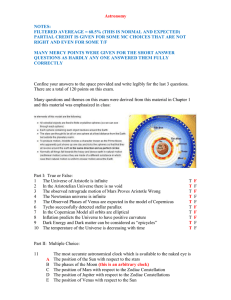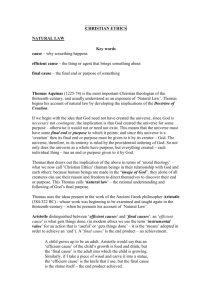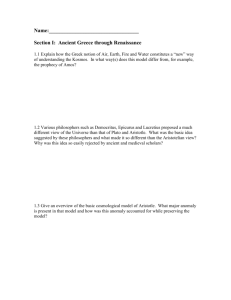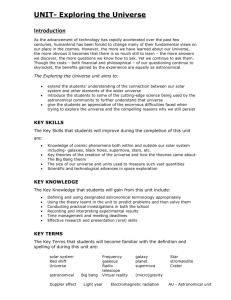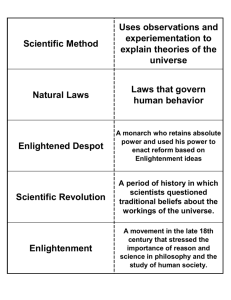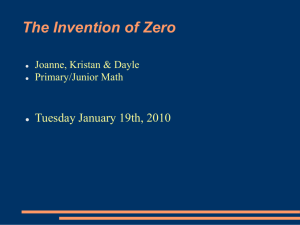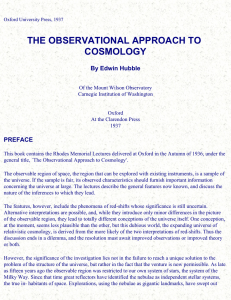Astronomy 123 Midterm Exam: - in a secure place with other
advertisement
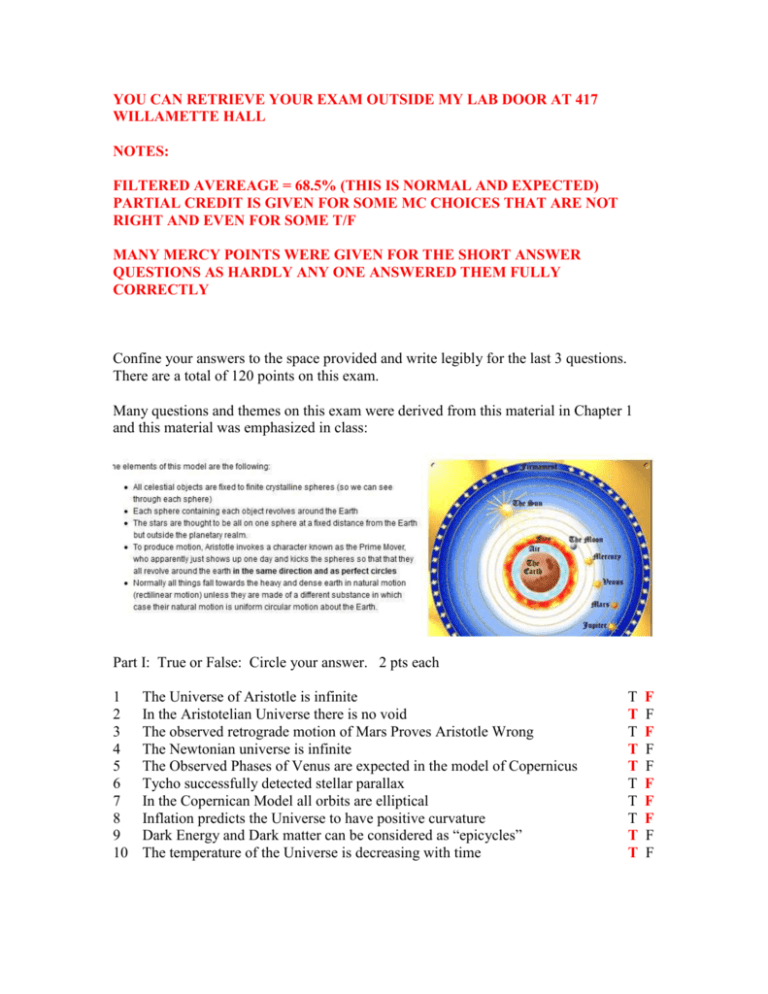
YOU CAN RETRIEVE YOUR EXAM OUTSIDE MY LAB DOOR AT 417 WILLAMETTE HALL NOTES: FILTERED AVEREAGE = 68.5% (THIS IS NORMAL AND EXPECTED) PARTIAL CREDIT IS GIVEN FOR SOME MC CHOICES THAT ARE NOT RIGHT AND EVEN FOR SOME T/F MANY MERCY POINTS WERE GIVEN FOR THE SHORT ANSWER QUESTIONS AS HARDLY ANY ONE ANSWERED THEM FULLY CORRECTLY Confine your answers to the space provided and write legibly for the last 3 questions. There are a total of 120 points on this exam. Many questions and themes on this exam were derived from this material in Chapter 1 and this material was emphasized in class: Part I: True or False: Circle your answer. 2 pts each 1 2 3 4 5 6 7 8 9 10 The Universe of Aristotle is infinite In the Aristotelian Universe there is no void The observed retrograde motion of Mars Proves Aristotle Wrong The Newtonian universe is infinite The Observed Phases of Venus are expected in the model of Copernicus Tycho successfully detected stellar parallax In the Copernican Model all orbits are elliptical Inflation predicts the Universe to have positive curvature Dark Energy and Dark matter can be considered as “epicycles” The temperature of the Universe is decreasing with time T T T T T T T T T T F F F F F F F F F F Part II: Multiple Choice: Choose the Best Answer (4 pts) 11 A B C D E The most accurate astronomical clock which is available to the naked eye is The position of the Sun with respect to the stars The phases of the Moon (this is an arbitrary clock) The position of Mars with respect to the Zodiac Constellation The position of Jupiter with respect to the Zodiac Constellations The position of Venus with respect to the Sun A B C D E A basic assumption in any Cosmological model is that the Universe Contains matter (not necessary) Is expanding Is infinite in extent Is governed by only a small number of fundamental forces (e.g. 4) Is homogeneous on some size scale A B C D E Galileo’s most important discovery that provided support for the Copernican Model was Craters on the Moon Spots on the Sun Horns around Saturn The phases of Venus The rotation of the Earth 12 13 14 Two identical masses are separated by distance D: At a distance of 3D the gravitational force will be A The same; gravity only depends on Mass B Smaller by a factor of 3 C Smaller by a factor of 6 D E Smaller by a factor of 9 None of the above A B C D E What Did Eratosthenes measure? The approximate distance to the Moon The rotation period of the Earth The radius of the Earth The tilt of the Earth C and D 15 16 A B C D The primary reason that Copernicus was motivated to make a new model of the Solar System was To improve the accuracy of calendars To replace circular orbits with ellipses To disprove Aristotle (NO) To prove that the Universe was infinite E None of the above A B C D E The Nature of the Microwave Background Informs us that the Universe is homogenous Manifests the Universe was once radiation dominated Indicates that matter must be present in the Universe (NO) All of the above None of the above 17 18 A B C D E 19 E = mc2 means that The speed of light is infinite(NO) Photons can never be destroyed (NO) Space is flat Photons are affected by gravity Equal amounts of matter and anti-matter must exist at all times (NO) A B C D E Hubble determined the distance to the Andromeda Galaxy By measuring its redshift By calculating its physical size By measuring its parallax By detecting globular clusters in it None of the above – he used Cepheid Variables A Harlow Shapley argued that: Other spiral nebulae were just like our Galaxy (Curtis) 20 B C D E That the Andromeda nebulae was a distant galaxy (Curtis) Spiral nebulae were not rotating Globular clusters defined the center of our Galaxy All of the above Part II: Short Answer Questions (10 points each): Answer 6 out of 7. 21. “it is manifest to any observer that the Earth occupies the middle place in the cosmos and that all weights move towards it” Who wrote this and what is the significance of this statement in terms of defining a cultural truth? LOTS OF MERCY POINTS HERE 22. Explain in terms of Aristotle’s ideas of motion why the Stars have to be made of a perfect and exalted substance. NOT ANSWERED WELL From Class: 23. What principal argument did Cusa use to suggest that the Earth, in fact, does move? MOST OF YOU MADE UP BS HERE BUT ABOUT 1/3 DID GET THIS MOSTLY RIGHT RELATIVE MOTION: the earth and the sun are merely possible points of view from which the motions of the celestial bodies may be described. While the Ptolemaic system which represent the planetary motions by combinations of circular motions - could take any point to be fixed, the choice of any particular point required some justification on other than astronomical grounds - there has to be some sensible definition and agreement on what is chosen as fixed 24. What techniques did Galileo employ to better measure the effect of gravity on the motions of objects? ANSWERED POORLY HE USED AN INCLINE PLANE AND MADE MEASUREMENTS IN RATIOS 25. What is Newton’s explanation for why the Moon has not fallen into the Earth? ANSWERED POORLY (Dark matter? Moon Pushes back? Sun Stabilizes?) BALANCE BETWEEN INERTIAL AND GRAVITATIONAL FORCES 26. Explain why the observed retrograde motion of Mars is a problem in Aristotelian Cosmology. What did Ptolemy propose to solve this problem? ANSWERED MOSTLY WELL PRIME MOVER KICKS THE CRYSTALLINE SPHERES IN ONLY ONE DIRECTION; MARS APPEARS TO BE MOVING BACKWARDS; NOT ALLOWED; PTOLEMY BUILDS AN EPICYCLE TO FIX THIS 27. According to Kepler’s Third Law, what would the orbital period be for an object located at a distance of 10 Astronomical Units from the Sun? (1 astronomical unit = distance from the Earth to the Sun) ALWAYS SHOW YOUR WORK P2 goes as A3 A = 10 A3 = 1000 P2 =1000 P = square root of 1000 years (31.62 but don’t care about that part)
